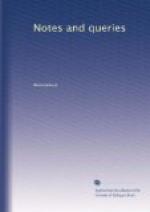“He was so farre the dominus fac totum in this juncto that his words were laws, all things being acted according to his desire.”—p. 76. of Foulis’ Hist. of Plots of our Pretended Saints, 2nd edit. 1674
F.M.
Birthplace of Andrew Borde
Hearne says, in Wood’s Athenae, “that the Doctor was not born at Pevensey or Pensey, but at Boonds-hill in Holmsdayle, in Sussex.”
Should we not read “Borde-hill?” That place belonged to the family of Borde for many generations. It is in Cuckfield parish. The house may be seen from the Ouse-Valley Viaduct.
J.F.M.
Order of Minerva
“We are informed that his Majesty is about to institute a new order of knighthood, called The Order of Minerva, for the encouragement of literature, the fine arts, and learned professions. The new order is to consist of twenty-four knights and the Sovereign; and is to be next in dignity to the military Order of the Bath. The knights are to wear a silver star with nine points, and a straw-coloured riband from the right shoulder to the left. A figure of Minerva is to be embroidered in the centre of the star, with this motto, ’Omnia posthabita Scientiae.’ Many men eminent in literature, in the fine arts, and in physic, and law, are already thought of to fill the Order, which, it is said, will be instituted before the meeting of parliament.”—Perth Magazine, July, 1772.
SCOTUS.
Flaws of Wind
The parish church of Dun-Nechtan, now Dunnichen, was dedicated to St. Causlan, whose festival was held in March. Snow showers in March are locally called “St. Causlan’s flaws.”
SCOTUS.
* * * * *
QUERIES ANSWERED.
DORNE THE BOOKSELLER AND HENNO RUSTICUS.
Sir,—Circumstances imperatively oblige me to do that from which I should willingly be excused—reply to the observations of J.I., inserted in page 75. of the last Saturday’s Number of the “NOTES AND QUERIES.”
The subject of these are three questions proposed by me in your first number to the following effect:—1. Whether any thing was known, especially from the writings of Erasmus, of a bookseller and publisher of the Low Countries named Dorne, who lived at the beginning of the sixteenth century? Or, 2ndly, of a little work of early date callled Henno Rusticus? Or, 3dly, of another, called Of the Sige (Signe) of the End?
To these no answer has yet been given, although the promised researches of a gentleman of this University, to whom literary inquirers in Oxford have ever reason to be grateful, would seem to promise one soon, if it can be made. But, in the mean time, the knot is cut in a simpler way: neither Dorne, nor Henno Rusticus, his book, it is said, ever existed. Permit me one word of expostulation upon this.




